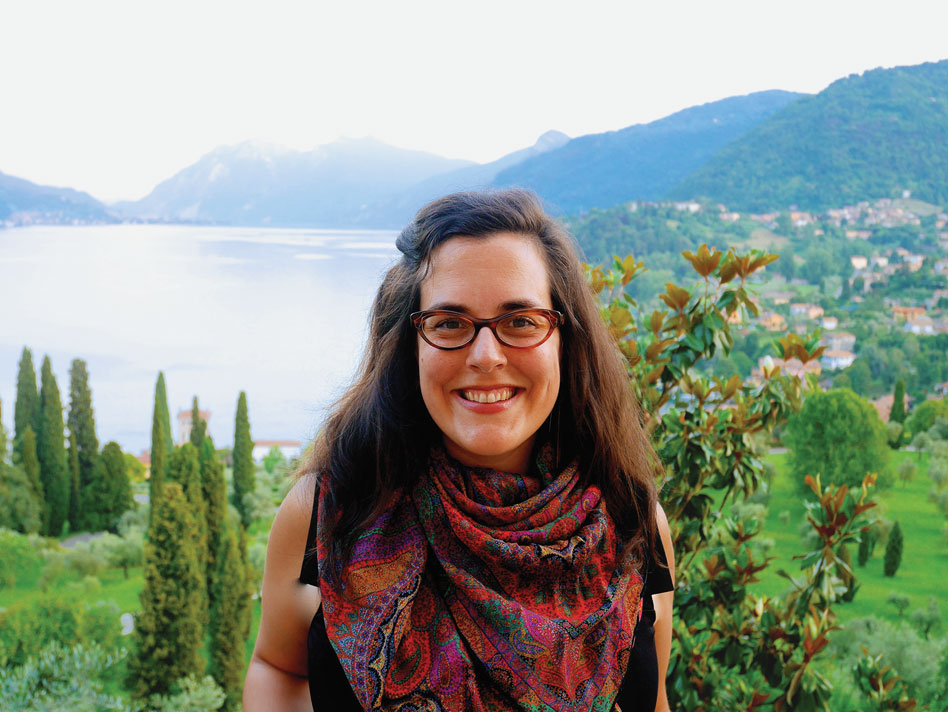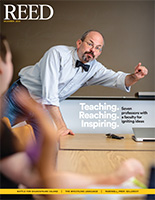
IRIS login | Reed College home Volume 95, No. 4: December 2016
Eliot Circular
Prof Wins Awards to Pursue Work on Radical Theatre

Prof. Kate Bredeson in Italy during her Rockefeller Center Residency this summer.
By Katie Pelletier ’03
Hidden away in a storage locker in Manhattan is a rolling suitcase containing a collection of notebooks cloth-bound in an assortment of colored chinoiserie. These are some of the diaries of the late Judith Malina, the legendary director and co-founder of the Living Theatre, the oldest experimental theatre company in the nation. The company was created to be a tool for political activism; this was at a time when women’s roles in theatre were largely confined to the stage or costume shop, making Malina’s achievements all the more revolutionary.
The going was never easy, but Malina had grit and optimism, and she wrote almost daily. When she died in 2015, the Living Theatre’s archivist, Tom Walker, and Malina’s son, Garrick Beck ’71, sought a scholar who could edit her diaries (a sizable body of work). They chose Prof. Kate Bredeson [theatre 2009—] whose scholarship focuses on theatre and performance during the student movement in Paris in 1968 and includes the Living Theatre. “This is my dream life project. It’s a deep privilege,” she says.
Beck and Walker wanted a scholar who was not of Malina’s generation. “People who write about the Living Theatre are often contemporaries of the company from the 1960s, and they wanted somebody younger to try to connect the company’s work and Judith’s work to current scholars and students,” Bredeson says. “There is this tendency when talking about the Living Theatre to dismiss them as just ‘those hippies.” Bredeson on the contrary has long been interested in Malina, who sought to completely rewrite the audience/performer contract. In plays like Paradise Now—which, as it happens, the Living Theatre brought to Reed not long after the tumultuous summer of ’68, and which Prof. Roger Porter [English 1961–2015] reviewed in the Quest—the Living Theatre blurred the boundaries between audience and performer and challenged notions about who makes theatre and for whom.
Bredeson’s work has also caught the attention of some prominent organizations. She won a competitive residency at the Rockefeller Center at Bellagio this summer, which took her to Italy to work on her book, A Lifetime of Resistance: the Diaries of Judith Malina. She was awarded the Edith and Richard French Visiting Research Fellowship at the Beinecke Library to conduct research this year during her sabbatical. She also won a research fellowship from the American Society for Theatre Research and has secured a monthlong residency at Caldera, an artists’ center in Oregon.
She is looking forward to writing about and bringing more attention to Malina and to women directors. “The Living Theatre is older than the Superbowl. This company that a lot of people sensationalize has been more successful than any other experimental theatre company in U.S. history. [...]We should laud them for that and look to them as an example of how to make work that endures.” Bredeson plans to focus her critical introduction and selection of diary entries for the book on Malina’s work as a director, specifically as a woman director. She will focus on Malina’s writing that illuminates her work in the rehearsal room, her artistic direction, and all of her determination to keeping her company going for so long.

LATEST COMMENTS
steve-jobs-1976 I knew Steve Jobs when he was on the second floor of Quincy. (Fall...
Utnapishtim - 2 weeks ago
Prof. Mason Drukman [political science 1964–70] This is gold, pure gold. God bless, Prof. Drukman.
puredog - 1 month ago
virginia-davis-1965 Such a good friend & compatriot in the day of Satyricon...
czarchasm - 4 months ago
John Peara Baba 1990 John died of a broken heart from losing his mom and then his...
kodachrome - 7 months ago
Carol Sawyer 1962 Who wrote this obit? I'm writing something about Carol Sawyer...
MsLaurie Pepper - 8 months ago
William W. Wissman MAT 1969 ...and THREE sisters. Sabra, the oldest, Mary, the middle, and...
riclf - 10 months ago